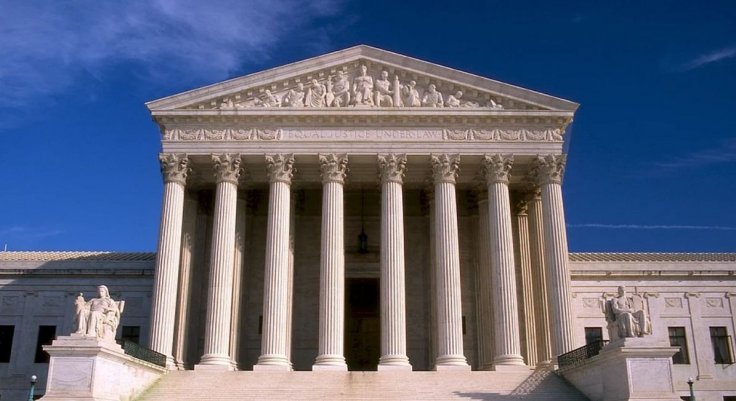The battle lines are drawn and a perfect storm is brewing up ahead of the US Supreme Court's impending decision on a lawsuit filed by Texas seeking to overturn the election of Joe Biden as US President.
This is a pivotal moment in the history of America. The country stands starkly divided, much like in the years of the Civil War, when 11 states wanted to break away after Abraham Lincoln was elected president. 'Secession' is now an open demand from the ultra right Republicans while the Democrats are trending #SeditiousSeventeen on Twitter.
As many as 18 states have supported the Texas move to annul electoral college victories by Biden in Michigan, Wisconsin, Pennsylvania and Georgia. On the other side, 22 Democratic states have taken position with the defendants.

The Supreme Court does not have too many days to take a decision in the case. The electoral college must convene on December 13 to cast their votes to elect the President, as per the constitution. Texas has buttressed the point that the top court must hear the case on Friday, December 11.
A whole lot of constitutional experts say the Texas case will be thrown out without the court even going into the merit of the plea.
"I think there's no basis for it. I don't think the Supreme Court, for an instant, will consider taking up this case ... What it shows you, I think... is that how far the Republican party has sort of corroded in basic beliefs under Donald Trump in this area," said Ben Ginsberg, a Republican election lawyer who helped George Bush mount a successful legal challenge against Al Gore in 2000.
Steve Vladeck, professor at the University of Texas Law School, even said the court won't even consider the case. "[I]t takes five votes to grant a motion for leave to file — which isn't going to happen," he said, according to the Newsweek.
The Court Verdict Will Not Solve Basic Problem
Well, that may well be the outcome but such a verdict is unlikely to solve the conflict. The simmering sense of disenfranchisement will only grow, moving America further into an inflection point in its history.
Prominent Republican commentator Rush Limbaugh captured the essence of the crisis pointedly. Limbaugh said there cannot be a peaceful coexistence between liberal and conservative America, going as far as to suggest that the right wing states must consider breaking away from the Union.
"I actually think that we're trending toward secession ... I see more and more people asking what in the world do we have in common with the people who live in, say, New York?," he asked.

Which States are with Texas?
The Texas lawsuit was unprecedented. It sought to annul the election in four key swing states narrowly won by Biden. If the outcome in these states - Wisconsin, Michigan, Pennsylvania and Georgia -- were different Trump would have earned a second term. The suit says the election in these states was tainted and the result must be thrown out, allowing the legislators to elect a different body of presidential electoral college.
The crucial element in this gambit is that the Congress in all these four states are controlled by the Republicans.
Red states like Missouri, Arkansas, Louisiana, Mississippi, South Carolina Utah, Arizona, Montana, North Dakota, South Dakota, Nebraska, Kansas, Oklahoma, Tennessee, Florida and Missourie are supporting Texas in the case.
Which States are on the Other Side?
As many as 22 blue states will stand with efendent states against the suit filed by Texas Attorney General Ken Paxton. These states are California, Colorado, Connecticut, Delaware, Hawaii, Illinois, Maine, Maryland, Massachusetts, Minnesota, Nevada, New Jersey, New Mexico, New York, North Carolina, Oregon, Rhode Island, Vermont, Virginia and washington.
Karl Racine, the District of Columbia Attorney General who is representing these states, has filed the amicus brief in the Supreme Court, seeking the dismissal of the Texas case.
Disenfranchisement, Collapse of Unitary Polity
The reality is that this divide is not just about Trump Vs Biden. Even after this election is decided finally, the wounds will remain open and festering. This election divided the nations right in the middle, a vertical split never seen since the 1861-65 era of the Civil War.
Both sides will harbor a deep sense of disenfranchisement even after this dispute is settled. People on both sides are veering around the belief that universal franchise can't offer a sense of justice and fairness in equal measure to one and all.
'Terminal Velocity' and How Societies Collapse
The emerging scenario was described in an analysis this author wrote on September 24, 2020. You can read it here.
In an article written in Foreign Affairs years ago, Harvard professor Niall Fergusson observed that the US may meet an 'abrupt end as a unitary polity' owing to the unique sets of crisis it would face.
Writing about the demise of historic civilizations in a BBC article last year, University of Cambridge researcher Luke Kemp used the term 'terminal velocity' to explain how societies collapse. "The U.S. is at risk of a downfall over the coming decade," Kemp wrote years ago. "There are early warning signals and the different contributors to collapse are rising," he wrote.
The United States currently meets all the criteria in this calculus -- unwieldy complexity, great social and economic inequality, highly-strung body politic and an exponential rise in the cost of defending itself. A rupture and fall from the height the country has scaled will have terminal velocity. In other words, the fall will be fatal.








